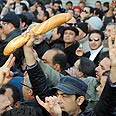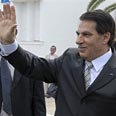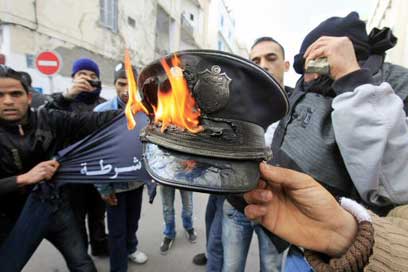

Arab activists celebrated the anti-government protests that ousted Tunisian President Zine El Abidine Ben Ali as the uprising raised hopes for similar change in other countries accused of having repressive regimes.
Saudi Arabia confirmed the former Tunisian president and his family had arrived in the kingdom early on Saturday morning to stay for an unspecified period of time.
"The kingdom welcomed the arrival of the President Zine al-Abidine Ben Ali and his family," a statement on the official Saudi Press Agency (SPA) said.
"The kingdom states its complete support for the Tunisian people and hopes all Tunisians stand together to overcome the difficult stage in their history," SPA said.
It said the royal court decision to welcome Ben Ali was based on appreciation of the "exceptional circumstances" Tunisia is going through.
A Saudi official told Reuters Ben Ali was in the port city of Jeddah.
Thousands of messages congratulating the Tunisian people flooded the Internet Friday on Twitter, Facebook and blogs, and many people replaced their profile pictures with red Tunisian flags.
Dozens of Egyptian activists opposed to President Hosni Mubarak's three-decade regime danced outside the Tunisian Embassy in Cairo, chanting "Ben Ali, tell Mubarak a plane is waiting for him too!"
Mubarak, 82, faces mounting dissatisfaction over the lack of democratic reform and frequent protests over economic woes in the country, a key U.S. ally.
Egyptian human rights activist Hossam Bahgat said he was glued to the news watching the fall of the Tunisian government and hoped that his countrymen could do the same someday.
"I feel like we are a giant step closer to our own liberation," he told The Associated Press. "What's significant about Tunisia is that literally days ago the regime seemed unshakable, and then eventually democracy prevailed without a single Western state lifting a finger."

Protest in Tunisia (Photo: Reuters)
Bahgat said the events in Tunisia would boost the confidence of opposition members in a region where leaders often rule for life.
"What happened in Tunisia ... will give unimaginable momentum to the cause for change in Egypt," he said.
Sudanese opposition leader Mariam al-Sadek said she had mixed feelings about the Tunisian riots: excitement the president was overthrown but sadness that her people haven't done the same.
Sudan's President Omar al-Bashir, who is wanted on an international indictment for war crimes in the western region of Darfur, faces the division of his country after a vote for southern independence, a rebellion in the west and east, and internal opposition.
"What caused this in Tunisia is so little compared to what we are going through," al-Sadek said. "Our country is being divided; our sovereignty is lost and we are humiliated, and this is happening in Tunisia ... I feel ashamed."
Jordanians also held separate protests Friday in several cities over rising prices for fuel and foodstuffs, although King Abdullah II slashed some prices and taxes earlier this week to try to stanch the public anger and ease the burden on the poor.
About 200 people, some wearing Tunisian flags as capes, huddled together on Paris' Place des Invalides after being directed away from the nearby Tunisian Embassy.
French police closed off the street where the embassy was located to foot and car traffic.
Haitham Nasri, a 21-year-old university student from the southern city of Sfax in Tunisia who has lived in Paris for two years, said Friday was a day of celebration but warned the mobilization could continue.
"It's like halftime in an important football match, when the home team is up 1-0. We're happy with our performance so far but are regrouping for the second half. We've won the battle but not the war yet," said Nasri, who was wrapped in the red-and-white Tunisian flag.
Reuters and AP contributed to the report
- Follow Ynetnews on Facebook















